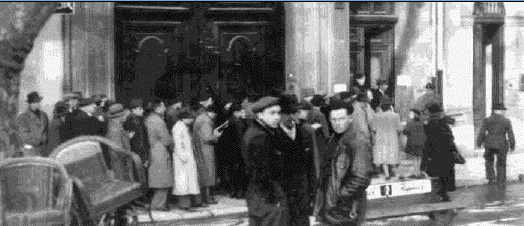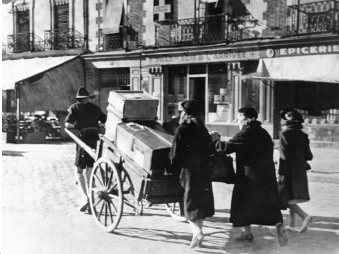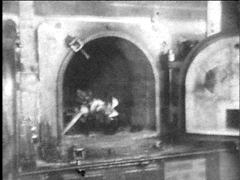
Exhibited
Photo: U.S. Consulate, Marseille, France,
1940.
|
|
<varianfry.org/images/00000_ac_consulate_refugees01.jpg>
|
On
July 10, 1940, the French Government in surrendering to
the Nazis divided France into 2 zones:
a Nazi-occupied zone that included Paris and
administrated by Nazis and, a so-called unoccupied zone
in the southeast with its administrative center at Vichy
and administrated by French ultra-nationalists.

|
In
1940, as Nazi invaders occupied France, tens of
thousands of refugees from all over Europe fled
south toward
Marseilles.
(Courtesy
of International Rescue Committee)
<holocaust-trc.org/vfplay.htm>

|
The Vichy
government, as was known to be called, operated on the
proposition of "returning France to French." Alien
"influence" was set to be combated at any cost and of
course the anti-Jewish sentiment was at all time high.
The Vichy regime did much indeed to cooperate fully with
Nazis in their campaign of prosecuting the Jews. The
United States at that time wanted to maintain good
relationship with the Vichy government and this, in turn,
was reciprocated by the Vichy regime that was courting
Nazi Germany in order to extract more concessions from
the German authorities.

|
.
|
|
Marseille
under the pro-Nazi Vichy
Government
|
Marseille at that
time was under the control of the pro-Nazi Vichy
government and Hiram Bingham IV (known at that time
as Hiram Bingham, Jr.) with Miles Standish were the two
American vice-consuls in Marseille in charge of visas. In
that capacity, both men were extremely busy in issuing
visas from the growing number of people trapped in
Marseille trying to escape the Nazi regime.
In August 1940,
Varian Fry --an American journalist arrived in Marseille
from New York determined to save all intellectuals of
Europe trapped in Marseille --the great majority being of
Jewish descent. (For
more on Varian Fry visit our commemorative
site.)
In the pursuit of his plan and rescuing operation,
Fry was able to work with both vice-consuls and yes, both
men issued visas to Jewish and other refugees attempting
to escape France to Portugal and other countries outside
of the Nazi regime's influence.
Varian Fry, in
his memoirs "Surrender on Demand" (Johnson Books, 1945,
p. 10) characterized as follows Bingham IV while in
Marseille:
"... he
has a heart of gold. He does everything he can to help
us, within American law..."
Since when does
a person with a "heart of gold" doing his "ordinary job"
of issuing visas to Jews and non-Jews alike qualify for a
"hero" status? In other words, if a person did not turn
Jews away or turn them to the Nazis -- is this the
"qualification" and the "mark" for an hero
status?

|
..
|
|
A
Holocaust crematorium at Buchenwald
|
|
Courtesy:
The Simon Wiesenthal Center
|
Furthermore, if one's life has not been at any time in
peril due to the consular activity performed, how that
squares with the definition of a hero? There is
irrefutable historic evidence that the Vichy government
to establish its credibility and legitimacy had no
intention of breaking established international laws with
the United States and thus no intention ever to break the
diplomatic immunity doctrine. There was nothing, but
absolutely nothing, from his activities as a diplomat
that Bingham IV could have done, while in Marseille,
to place his life in jeopardy or danger. The absolute
worst scenario (which actually did happen) was the
removal of the offending diplomat from Marseille.
Why
Mr. Robert Kim Bingham, son of Bingham IV, sets
the "bar" so low when it comes to Jewish lives? Why
Mr. Bingham believes that his dad should be
considered a hero merely because his dad did not send
away Jews to the Holocaust's crematoria?

.